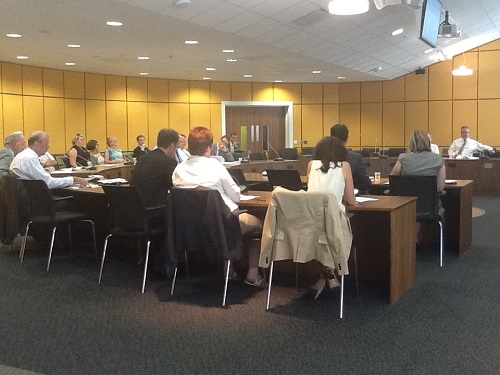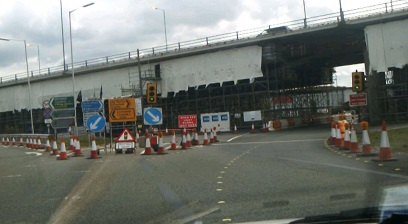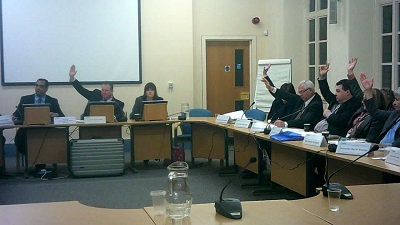Cllr McGlashan “before you even get out of the airport you’ve got to change money to get a pound to put the bloody..”
Cllr McGlashan “before you even get out of the airport you’ve got to change money to get a pound to put the bloody..”

Merseytravel meeting (25th July) Right Cllr Les Rowlands, centre background Cllr Steve Foulkes and Cllr Ron Abbey where councillors discussed Liverpool John Lennon Airport
Last Friday, as well as discussing the Open Golf and Mersey Gateway bridge tolls issue councillors on Merseytravel also discussed (which is rather topical as many people will be using Liverpool Airport at this time of year) a report titled “Liverpool John Lennon Airport Surface Access Delivery Plan July 2014” and its appendix which was a forty-three page draft plan.
In case the rather opaque title of the report means absolutely nothing to you (the officer who wrote it Peter Sandman summarised the report and draft plan for councillors at the meeting) it was about improving access to Liverpool John Lennon Airport by bus, improving marketing (which includes joint marketing of the airport by Merseytravel and the airport itself) and the customer experience (improved information & improved customer service as well as other areas). The review was started in September 2013 and the draft plan contains improvements to be carried out between now and 2016.
An example of some of the improvements in the plan are better signage to the bus stops at the airport, a cleaning regime for the bus stops and airport staff receiving WorldHost training (provided by Merseytravel). This is the same free training that was offered to Wirral’s taxi drivers ahead of the Open Golf Championship. The Northern Rail ticket machine has also been moved from the airport (which doesn’t have a rail connection and where there were poor ticket sales) to nearby Liverpool South Parkway train station.
Bus timetables are now available outside the main arrivals point and if Merseytravel get grant funding they plan to have an electronic departure board for buses in the airport’s arrivals hall and at the bus stops. Merseytravel is also in talks with bus operators that serve the airport to enhance the quality of the existing routes. Councillors will be receiving a quarterly report on progress. A number of councillors had things to say about the report and draft plan at Merseytravel’s meeting.
Cllr Ken McGlashan (Knowsley) said, “Thanks Chairman, thanks for that excellent report Pete, really good. It reports on the warts and all, if you look at 3.3, 3.3.1 “how to retain and grow local outbound marketing in the face of competition from other regional airports” and let’s be clear about it, if you’re not to go about it the wrong way, Liverpool John Lennon Airport have precisely done that.
I think from our house to Manchester is about twenty-eight minutes, it’s round about the same I know you’ve got to go to Huyton, it’s about the same to Liverpool Airport but then again if I was to go to Liverpool Airport now, I’ve got to pay to drop off! You know is this a good advert for anybody? I think also you’re charging for trollies as well, Manchester you don’t. You know it is a nonsense!
Imagine a transatlantic flight was diverted to Liverpool and some are trying to find quarters that don’t fit the pound machine. So before you even get out of the airport you’ve got to change money to get a pound to put the bloody… sorry about that, to put your luggage on, you know.
When they owned the airport, the authorities owned the airport, we sold it to Paul err Peel, because they were going to offer us a better service. They in turn put it onto these Canadians, who now seem to be doing everything they can to move everything to Manchester so you know I think the more influence we can have about this to get them to look at this the better.
The 500 service, Merseytravel initiated that, Arriva didn’t! Until it was making a profit, they just got in there and took it off us because it was making a profit.
Now, we’re travelling and I’ll say to them, that the officers have received complaints but they’re doing exactly the same with the trains. The train comes in on each side, the bus comes in at another time. You know, we’re talking about integration, meeting our people’s needs. I mean to do that, you say yourself, you put yourself out to meet passenger needs and unfortunately I don’t think they are at present. A bit of a rant Chair I’m sorry.”
Peter Sandman (Merseytravel’s Customer and Business Development Manager) said, “It’s a fair point, I think the point has been made to the Airport. I think one important thing we have done is started to have that regular dialogue to be perfectly honest with you.
I think the charging for parking, you could argue that it encourages use of the public transport network if I’m being honest with you. One thing the Airport have pledged to do is to really support basically not levy any parking charges to the bus operators who’ve actually started to think about how they are running the service commercially into and out of the airport to increase the provision of service and there is support there absolutely.
I think the other point is that with Peel now taking on the majority shareholding with the airports, the feedback from bodies it’s certainly they are much more focussed on strategic development and commercial development of the airport.
I mean that seems to travel my shift away from the way the previous owners, … felt towards the Airport. So hopefully through this process we have genuinely made those representations to answer your question, as you correctly say and then through this ongoing dialogue we’re starting to look at how those issues be resolved for the benefit of the customers who ultimately will sustain the Airport going forward.”
If you click on any of the buttons below, you’ll be doing me a favour by sharing this article with other people.


